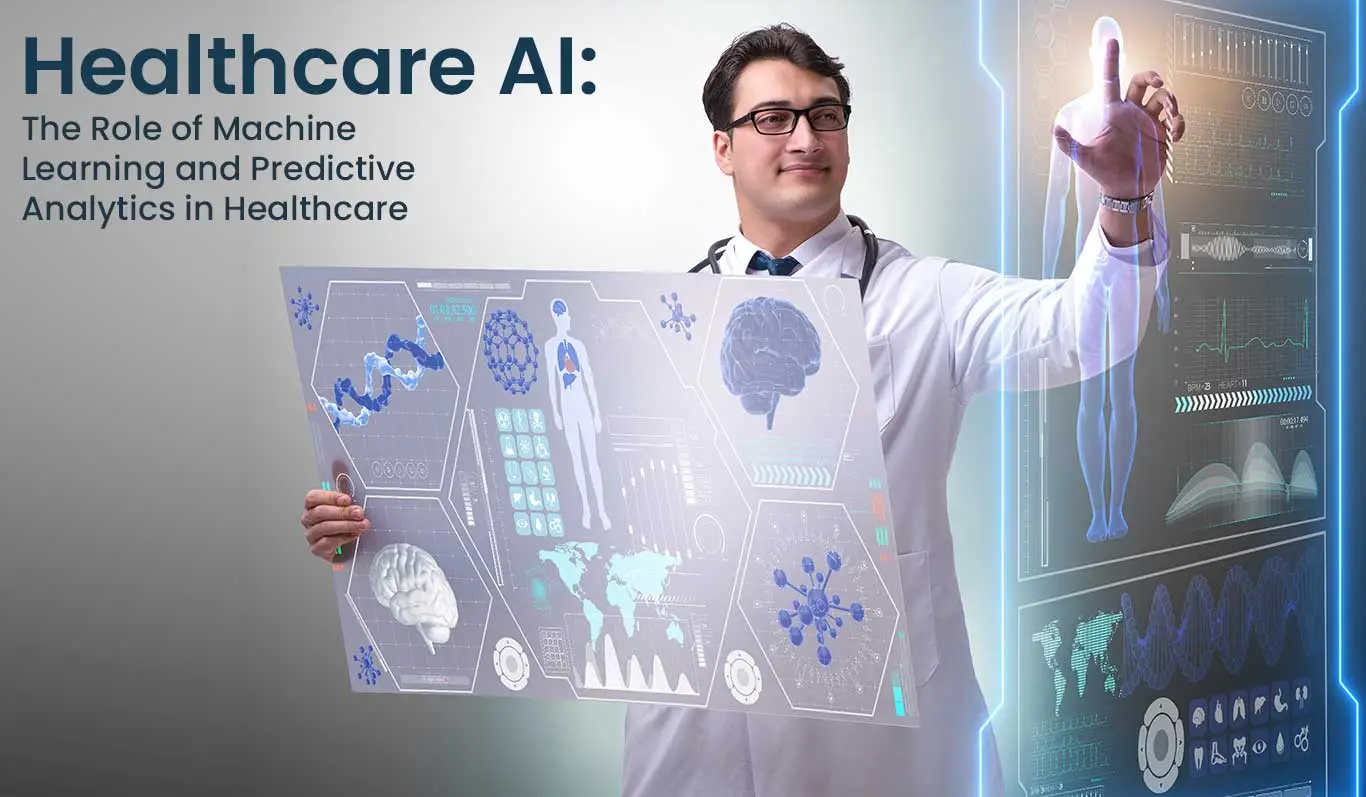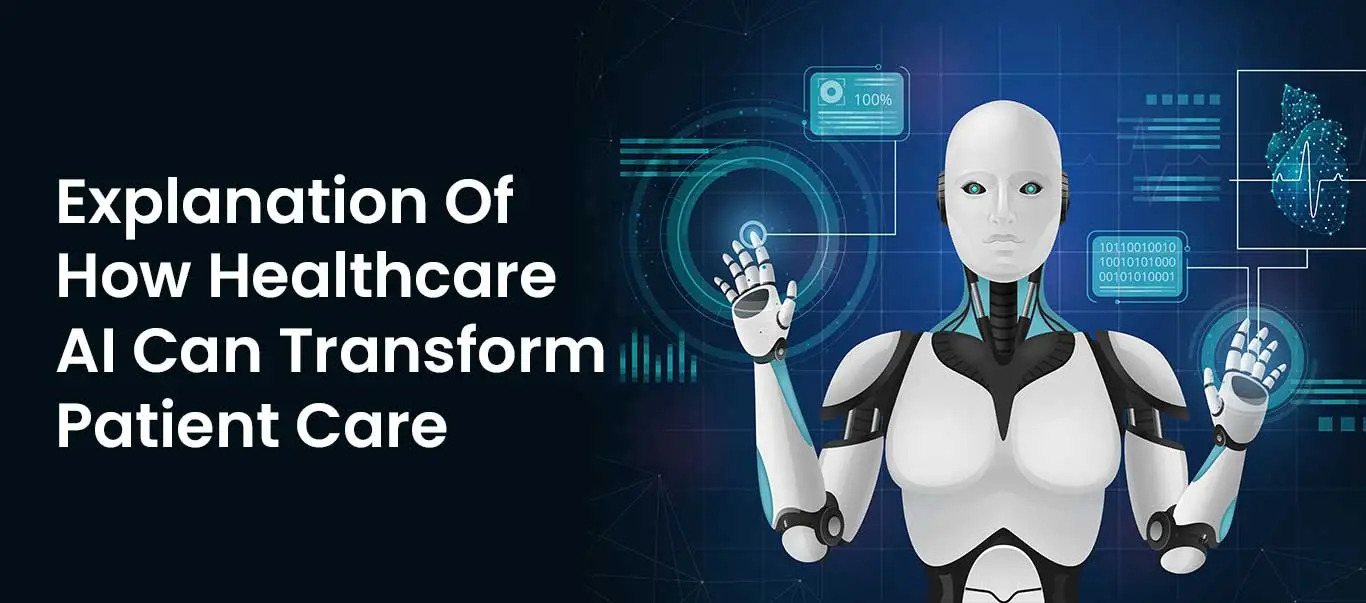Healthcare AI: The Role of Machine Learning and Predictive Analytics in Healthcare

Introduction
Picture a world where doctors can predict and prevent diseases before they happen. A world where patients receive personalized treatment plans based on their unique medical history. This is the reality we are inching ever closer to with healthcare AI.
What is Healthcare AI?
Healthcare AI involves using artificial intelligence (AI) technologies like machine learning and predictive analytics to improve healthcare outcomes.
Using machine learning, algorithms are trained to recognize patterns in data and make predictions.
The goal of predictive analytics is to analyze past data and predict what will happen in the future using statistical algorithms.
The use of these technologies in healthcare can help diagnose diseases, develop treatment plans which are 100% accurate, predict diseases before they occur, and ultimately improve patient outcomes.
Explanation Of How Healthcare AI Can Transform Patient Care

Healthcare AI has the potential to transform patient care in many ways. Healthcare AI uses machine learning and predictive analytics to analyze huge amounts of patient data. It provides insights that help doctors make better decisions.
For example, AI can predict which patients are at risk of developing certain conditions, allowing doctors to take preventative measures before it's too late. It can also help doctors personalize treatments based on a patient's unique genetic makeup, leading to more effective outcomes.
But that's not all.
AI can also assist with tasks like medical imaging analysis and diagnostics, reducing human error risk and improving accuracy. It can even help patients manage chronic conditions like diabetes by monitoring their symptoms and providing personalized recommendations for diet and exercise.
Healthcare AI is like having a team of super-powered doctors on your side, working tirelessly to keep you healthy and happy. And that's something we can all get behind!
Benefits of Healthcare AI

Accessible
According to WHO, limited or zero healthcare accessibility causes the 18.1-year gap in life expectancy between the world's richest and poorest nations. AI innovations can provide efficient healthcare to these disadvantaged areas. With AI-backed digital systems, patient diagnosis and treatment can be facilitated, and dedicated applications have been created to assist international and national healthcare organizations in rendering necessary assistance. In the COVID-19 pandemic, Ada, a health platform with AI, enabled disease self-assessment.
Easily share information
Benefits of artificial intelligence in healthcare include easy information sharing. Precision medicine requires algorithms that can analyze large amounts of data quickly. AI in healthcare enables doctors to focus on medications and treatments instead of finding patient data. People with diabetes can monitor and manage their glucose levels in real-time using glucose broadcasting systems. As the healthcare industry uses AI to store, collect, and analyze data, wearable devices can provide insight into diseases' likelihood of occurrence.
Diagnose early
AI-driven tools use people's data to assess their past and present health issues. Comparison of disease details improves diagnosis accuracy. Several healthcare apps have compiled millions of symptoms and diagnoses. The data can also be used to predict future health issues. The Verily application from Google, for instance, predicts genetic diseases. By using such tools, health experts can predict and prepare for potential threats in the future. As a result of predictive analytics, healthcare facilities now have better operational management.
Faster and cheaper
AI algorithms make healthcare processes faster and more cost-effective. AI has revolutionized the way we examine and diagnose patients. We can identify disease biomarkers in our bodies with AI algorithms, which minimizes the manual work involved in its specification. By automating, we can save more lives. As AI algorithms use predictive data based on personal information, AI algorithms are considered more cost-efficient than traditional methods. This explains the increased adoption of AI across the board last year - up to 88%.
Patient-focused care
Crowded and chaotic healthcare facilities result in poor patient experiences. In healthcare settings, AI can simplify the process of navigating data, obtaining reports, and directing patients to where to go. According to a recent study, poor communication is the most concerning aspect for 83% of patients. A key advantage of AI technology is its round-the-clock availability. Among the innovations of artificial intelligence for medication is Babylon, a tool that provides patients with an intuitive way to check their side effects. To provide accurate, up-to-date medical information, the system asks questions and examines answers.
Surgical assistance that's efficient and unique
Artificial intelligence has made significant progress in robotics, especially machine learning. In addition to reducing side effects, blood loss, or pain, AI surgical systems can perform tiniest movements with 100% accuracy. Real-time AI-backed information on a patient's present situation improves post-surgery recovery.
Supporting mental health and abilities
Medical robots now facilitate patients' recovery from paralysis with little or no assistance from caregivers. Sensor-equipped prostheses are more reactive than traditional models, and machine learning-based robots provide companionship and perform daily tasks. Depressed patients can benefit from robots with built-in analytical capabilities, which can analyze their mood and help them feel better.
Applications of Healthcare AI in Patient Care
Diagnosing diseases using medical imaging analysis
Medical imaging analysis powered by AI has revolutionized disease diagnosis, allowing professionals to identify diseases faster and more accurately. Healthcare providers can detect even the slightest anomalies by using machine learning algorithms to analyze X-rays, CT scans, and MRI scans. As a result, diseases such as cancer, heart disease, and stroke can be detected early.
Personalized treatment plans using predictive analytics
Predictive analytics allows for personalized treatment. Machine learning algorithms can analyze a patient's medical history, lifestyle habits, and genetic makeup to develop customized treatment plans. By targeting and optimizing treatment for each patient, better outcomes can be achieved and healthcare costs can be reduced.
Remote monitoring of patients using AI-powered wearables
Smartwatches, fitness trackers, and health sensors powered by AI can monitor patients remotely. Real-time monitoring of a patient's vital signs, activity levels, and other health metrics is possible. By analyzing this data, healthcare providers can detect changes in a patient's health status and intervene before a crisis occurs. Diabetes, heart disease, and hypertension patients especially benefit from this.
Drug discovery and development using machine learning
Drug discovery and development are also being revolutionized by machine learning. Clinical trials and medical research data can be analyzed by machine learning algorithms to identify potential drug candidates. Using this method, drug development can be sped up and costs reduced. A machine learning algorithm can also identify patients who are likely to benefit from a particular treatment.
The Future of Healthcare AI: Revolutionizing Health Care Delivery and Outcomes
With the rapid advancements in AI technology, we are witnessing a new era of collaboration in the healthcare industry.
Bing Copilot
Health care professionals could access the latest research and treatment options in real-time through a search engine. Providers could spend less time researching and documenting patient information, allowing them to focus on patient care.
Bing Copilot is an AI-powered search engine for healthcare professionals. Real-time information is provided using advanced algorithms and natural language processing. Using Bing Copilot, healthcare professionals can access the latest medical research, guidelines, and treatment options, enabling them to provide the best care possible.
BioGPT
BioGPT is a future product in the ChatGPT series that will revolutionize medical research. It will be able to process and understand complex biological and medical data. Researchers and medical professionals can use BioGPT to accelerate drug development and make breakthrough discoveries using biomedical data and research. Predicting the efficacy and safety of potential drug candidates with BioGPT could lead to more targeted and effective treatments.
PaLM
PaLM plays a crucial role in disease diagnosis and management. PaLM's AI integration has the potential to transform disease management. Medical professionals can design more effective and targeted treatment plans using AI-powered algorithms. The use of AI can also streamline lab data management, ensuring timely results and improving patient care.
Conclusion
The future of healthcare delivery is here, and it's powered by AI! The potential of AI-driven technologies to revolutionize healthcare delivery and outcomes is endless. With the rapid advancements in AI-driven technologies and tools, it can be used to enhance knowledge, streamline daily tasks, improve diagnostic accuracy, and above all, provide the best possible care for our patients.
By embracing innovation and fostering collaboration between AI and health care professionals, we can unlock the true potential of AI-driven tools to revolutionize health care and bring about positive change in patients’ lives worldwide.
Request a Quote
Categories
Popular posts
Best Practices for Software Product Engineering Every CTO Should Implement
2023-14-18How to Build Your Own On-Demand Carpooling App Services?
2023-08-25How to Start an On-Demand Fuel Delivery Business: A Comprehensive Guide
2023-07-28Empowering Miners: How Fleet Management Apps are Transforming the Mining Industry?
2023-07-21A Complete Guide to Develop a Food Delivery App for Restaurants in 2023
2023-07-08Mobile Apps Transforming the Travel Industry: A Game-Changer in Travel Planning and Experience
2023-07-07
